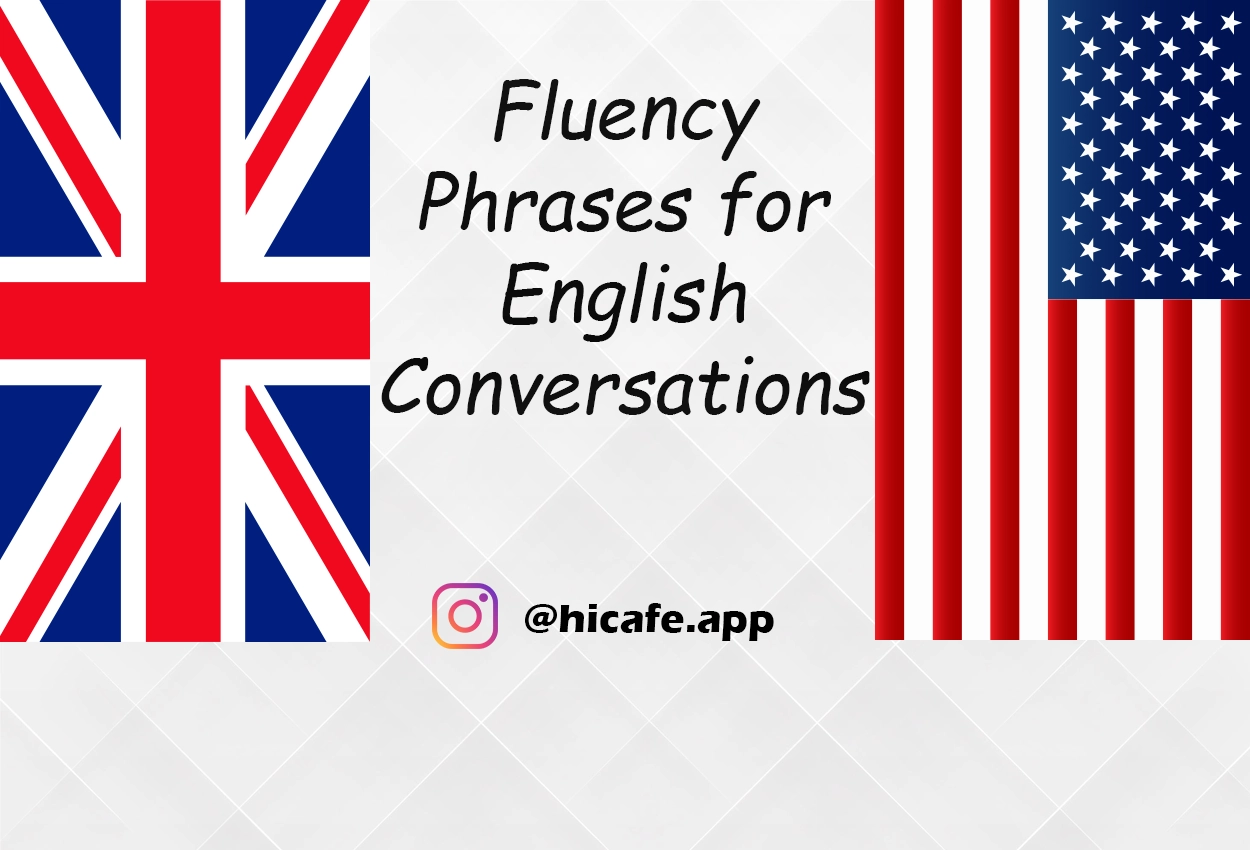Speaking English fluently can feel like an impossible dream. But what if we told you there’s a secret weapon that can dramatically boost your confidence and make you sound like a native speaker? That weapon is fluency phrases, the building blocks of natural, effortless conversation.
This lesson will reveal the power of phrases for fluent English such as collocations, signaling phrases, and fixed phrases, three key types of fluency phrases that will transform your English speaking. We’ll show you how to learn them, practice them, and use them in your everyday conversations. Get ready to speak English with greater confidence and ease!
Previous Conversation Tip Lesson
Three Word Phrases for English Conversations
Phrases for Fluency in English
1. Collocations
Click here to practice this conversation tip in Instagram.
Collocations are words that frequently occur together, creating a natural and idiomatic sound. They reduce hesitation and pauses, they also make you sound more natural and confident. Besides, they help you sound more precise and sophisticated.
Six types of collocation
- Adjective + noun
Example: bright sun, heavy rain, strong coffee.
- Noun + noun
Example: a cup of tea, a pack of cards, a piece of advice.
- Verb + noun
Examples: make a mistake, take a chance, catch a cold.
- Adverb + adjective
Examples: completely exhausted, highly motivated, perfectly clear
- Verb + preposition
This is common in phrasal verbs, such as look after, get along with, come up with.
- Verb + adverb
Example: eat slowly, speak clearly, walk quickly.
Learning collocations
When picking up new words, ensure that you understand how they pair with other words. You can consult dictionaries to provide you with the proper collocations. There are even specialized collocation dictionaries available.
2. Signaling phrases
Click here to practice this conversation tip in Instagram.
Signal phrases are used to indicate our intentions in a conversation, helping the others understand the upcoming message. By incorporating signal phrases into our speech, we can effectively convey the details relevant to the current conversation. For example:
- I’d like to go out for lunch.
- I’d like to try the new Japanese restaurant.
Or
- Can I just say something here?
- Can I just say how pleased I am with all your efforts …
These phrases are helpful because they’re widely used and easy to understand. Similar to the ones mentioned earlier, they are straightforward. You’re likely familiar with expressions such as “I’d like to” or “If I were you I’d,” which can be placed at the start of your sentence. They also provide you with some time to gather your thoughts for the rest of the sentence.
Learning signaling phrases
Listen to some regular spoken English for common expressions to suggest things, share opinions, politely interrupt, ask for assistance, etc. You can tune in to radio shows, TV programs, podcasts, talk shows, and dramas.
You don’t have to gather all the phrases. Pick a few that seem natural and comfortable to you. Practice saying them so you can feel confident using them.
Ensure you can pronounce them easily and know when to use them appropriately, as some may be more formal or informal than others.
3. Fixed phrases
Click here to practice this conversation tip in Instagram.
These are fluency phrases which you don’t need to change at all. They’re ‘fixed’! Here are some examples.
Automatic replies
When someone says ” thank you” and you respond with “you’re welcome” or “it’s a pleasure,” you are using an automatic response. Similarly, when asked “how are you?” and you reply with “fine thanks,” or when faced with surprising news and you exclaim “no way!”, these are all pre-set, automatic responses.
Complete phrases
Another type of set expressions includes complete phrases like “How are you?” or “Pardon me.” These are commonly used in specific situations, such as during greetings or when seeking passage.
Idioms and phrasal verbs
Idioms are complete blocks of language, like “to learn the ropes” (when you learn how to do your job), or ‘work something out’ (to find a solution). These phrases typically remain unchanged, although many phrasal verbs require an object.
Other fixed phrases
There are also other types of fixed phrases.
For example, lots of time expressions, such as “up to now”, “just now”, “in the meantime” are fixed phrases.
Fixed phrases also include two-word expressions like “flip flops” (the type of sandal you wear on the beach) or “so-so” when something is OK but not brilliant, or “easy-peasy” (when something is very easy), and three-word phrases (where you have two words separated by ‘and’ or ‘or’) like “tried and tested”, “sooner or later”, “pros and cons”, “all or nothing”.
Learning fixed phrases
When learning English, common phrases are usually picked up early, especially during English classes. Expressions like “you’re welcome,” “no way,” or “fine, thanks” become automatic. The real challenge lies in mastering idioms and phrasal verbs. Whenever you come across these, make a note and look them up for better understanding. For phrasal verbs, pay attention to common collocations. For instance, with “work out,” you often pair it with “solution” or “answer,” like “work out a solution” or “work out the answer.”
Conclusion
Mastering fluency phrases is a game-changer. By using these pre-built phrases, you can speak more confidently, reduce hesitation, and sound more natural in your conversations. Imagine effortlessly weaving words together, expressing yourself clearly, and engaging with others with newfound confidence. This is the power of fluency phrases.
Now that you’ve discovered the secrets of fluency phrases, you’re well on your way to achieving your English speaking goals. Start practicing them today!
Next Conversation Tip Lesson
Talking About the News in English
Related Conversation Lessons
None
Practice Conversation with HiCafe App
By using HiCafe App, you can join free discussion events and Practice English Conversation online or in-person and improve your verbal skills.
All Conversation Lessons
To see and read all of our conversation lessons, you can visit our Improve English Speaking Skills page.



